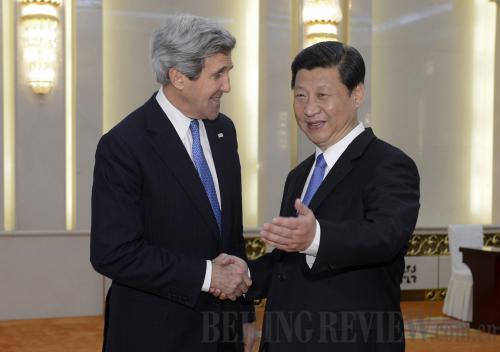|
 |
|
DIPLOMATIC DISPLAY: Chinese President Xi Jinping meets with U.S. Secretary of State John Kerry in Beijing on April 13 (CNSPHOTO) |
Following a packed day of meetings with Chinese leaders including President Xi Jinping, Premier Li Keqiang and State Councilor Yang Jiechi, John Kerry hailed his first visit to China as U.S. secretary of state as "extremely positive and constructive...beyond what I anticipated in many regards" in the media briefing held in Beijing's Diaoyutai State Guesthouse on April 13.
In the briefing, Kerry added that the United States wants a "strong, normal and special" relationship with China, which he described as a great power in Asia with a great ability to bring change to the world. While meeting with Chinese Foreign Minister Wang Yi, Kerry expressed interest in creating a roadmap to facilitate the development of bilateral ties.
The tight schedule demonstrated the significant value placed on the new U.S. secretary of state's China trip, which observers said was successful and fruitful. Though divergence still exists over contentious issues, the visit was helpful in deepening the strategic mutual trust of the two countries after their leadership transitions and promoting cooperation in specific areas, they said.
Reasonable perception
"Although Kerry did not put forward the notion of a 'strong, normal and special' relationship during his talks with Chinese leaders, it reflects his own perception of bilateral relations," Jia Xiudong, a senior research fellow with the China Institute of International Studies (CIIS), said to Beijing Review.
Jia said the Sino-U.S. relationship has gone beyond the bilateral scope to carry regional and global significance. Therefore, the "special relationship" requires wide-ranging dialogue and cooperation between the two countries.
With a new leadership in China and a number of new senior officials in the United States, Kerry's Beijing trip was somewhat carefully designed to test the waters. Besides getting to know new faces in the Chinese leadership, observers said Kerry also expected to use his visit to acquire first-hand information for fine-tuning U.S. policy toward China during the second Barack Obama administration.
Shi Yinhong, Director of the Center on American Studies at the Renmin University of China in Beijing, claimed that to a certain degree, Kerry's China trip was a new start for the new governments of the two countries to conduct dialogue on bilateral relations and global issues, as well as the beginning of a new striving to build a new type of major power relationship.
During talks with Kerry, both Xi and Li said China is willing to work with the United States to find a path for the relationship to progress based on mutual respect, increased mutual trust, expanded cooperation and appropriate handling of differences.
Kerry shared a similar line with Chinese leaders, saying in an address to reporters in Beijing: "We have a stake in China's success. And frankly, China has a stake in the success of the United States. A constructive partnership that is based on mutual interest benefits everybody in the world."
Ruan Zongze, Vice President of the CIIS, told Beijing Review that compared with the former U.S. Secretary of State Hillary Clinton, who is more concerned about her political future, Kerry is more professional in international affairs. Though it is impossible for Kerry to change the U.S. "pivot-to-Asia" strategy, he will make some adjustments for diversification, focusing more on trade and economic areas.
Jia echoed Ruan's thoughts in noting that Kerry has a good knowledge about China and attaches importance to the Sino-U.S. relationship. Kerry has had many previous interactions with China and understands the country's concerns, said Jia.
In his confirmation hearing to become secretary of state in January, Kerry said the United States has more military bases and forces in the Asia-Pacific region than any other country in the world—enough to put countries in the region on guard. He noted, "Every action has its reaction," which observers said was a signal Kerry gave to indicate acknowledgement of China's concerns.
The so-called U.S. "pivot" has sparked tensions in East Asia, triggering unreasonable expectations over the country's involvement in bilateral disputes in the region. Taking advantage of the U.S. rebalancing strategy, several neighboring countries began to ramp up maritime disputes with China, Ruan said.
| 